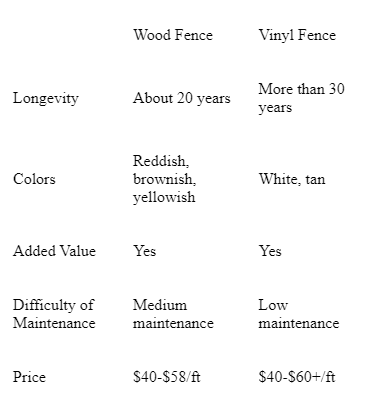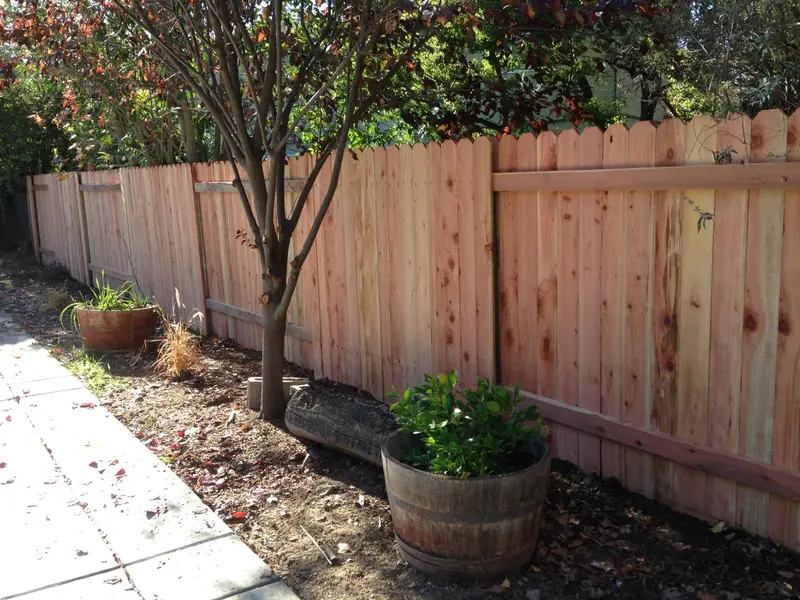Fencing is key to creating privacy around your property. Whenever you rest on your porch or host a grill party in your yard, no envious eyes will look upon you.
There are so many types of fences you can purchase: wood, vinyl, chain link, ornamental iron, and more. The two most common residential fences are wood and vinyl. You can almost always spot them when driving through any neighborhood.
They both look aesthetically pleasing and hide your property. Not only do they create a private space outdoors, but they also provide security. It is a great way to mark up your territory and keep undesired intruders from ruining your lawn.
Here, we will compare these two kinds of fences – wood and vinyl – and help you choose the best one for your property.
What Is the Difference Between Wood and Vinyl Fences?
The first obvious difference between wood and vinyl fences is the material used to produce them.
Wood fences are usually made of redwood or cedarwood. Both kinds of wood are different in color, with redwood having a medium-dark shade of burgundy, while cedarwood is naturally yellowish.
For those of you looking for an environmentally friendly fence, wood is the right choice. Both main kinds of wood are eco-friendly and 100% natural. When it comes to sustainability – good news here, too – both redwood and cedarwood are grown in a number sufficient to meet the demand sustainably in the US.
The longevity of wood fences is a different story that we will discuss in detail later in this article.
Vinyl fences are made of polyvinyl chloride (PVC). They come in all sorts of colors, and they can even mimic the wood grains in natural lumber. Vinyl fences are more versatile, but their material makes them environmentally unfriendly. On the other hand, quality vinyl fences can outlast wood fences by years and are quite low maintenance.
Once your vinyl fence has come to the end of its lifespan, it can be recycled. The recycled material can be reused to make fences, pipes, windows, or even music records.
Whether a vinyl fence is better than a wood fence, you will learn later in this article.
Wood vs. Vinyl Fences: In-Depth Comparison
“Will a vinyl fence or wood fence suit my house best?” is the question we will help you answer. We’ve collected the most common concerns people have about the two kinds of fences and listed them below. They are:
- Which fence is more durable: a wood or vinyl fence?
- Which kind of fence looks richer?
- Can I add value to my property with a wood or vinyl fence?
- Which fence requires the least attention from me?
- Is a wood or vinyl fence cheaper to install?
- Is a wood or vinyl fence cheaper to repair or replace?
Durability and Longevity
First things first – the durability and longevity of wood and vinyl fences.
The average lifespan of a wood fence is about 20 years. Vinyl fences last 10 years longer than their wood counterparts and often even longer when maintained properly.
To ensure your wood fence serves you for that long, you need to run frequent maintenance and repairs.
Visual Appearance
Wood fences can add a warm look to your home. Regardless of redwood or cedarwood, both reddish and yellowish colors create a premium look, adding to the ambiance of your property. Wood fences are therefore chosen by many homeowners because of how aesthetically pleasing they look.
Vinyl fences are, in contrast, very versatile. You can choose a fence that will match your property, be it a black fence, gray, or wood-like style.
Both wood and vinyl fences can do a fantastic job, blending well into the exterior of your home if picked carefully.
Added Value to Your Property
At some point, homeowners will plan on selling their property due to various factors. If you are one of them, ideally, you want to profit from the sale as much as possible. This means making your home crystal clean, eliminating any defects, and also attending to your yard.
Installing a fence is a relatively affordable upgrade to your house that can add value to your property. Regardless of whether you opt for a wood or vinyl fence, both will increase the property’s final price (provided your fence is in good condition and installed well).
Ease of Maintenance
Many homeowners highlight the importance of spending as little time on maintenance as possible. There are plenty of other responsibilities and chores to take care of, and we perfectly understand that.
The upkeep of a wood fence is an important task. Since it is a natural material, it is prone to rot and crack. It is susceptible to mold and mildew, so cleaning a wood fence at least once every three years is necessary. Once every few years, you should also recoat it with a sealant against water, UV light, and extreme temperatures.
Besides applying a coating, you will need to scrape off the old paint, spray an anti-mold solution and use moisture-resistant paints.
Caring for a vinyl fence, on the other hand, is relatively effortless. It doesn’t require a lot of your time or costly maintenance products. Washing it off with water and a piece of cloth is sufficient to keep the dirt and dust off in most cases.
Cost of Installation
Now, we have come to the most important question – the cost. The final price always depends on your answers to these questions:
- How many feet are you going to install?
- What material do you want (wood or vinyl)?
- What style do you want (Dog Ear, Cap and Trim, etc.)?
- Are there any gates? If yes, how big?
- How many meters in height do you want your fence to be?
There could be other factors that we will ask you about, including the area and the condition of the soil.
Typically, wood fencing varies between $40-$58/ft. The vinyl fence is usually in the same price range, from $40-$60+/ft, depending on the quality of the material.
Cost of Repair or Replacement
The cost of repair or replacement also depends on the factors described above. The repair will also depend on the piece of fence that needs to be repaired or changed.
The usual signs of tear and wear on wood fences include rotting, warping, and breaking due to exposure to wind, rain, and sun.
Vinyl and wood fences may lean due to strong wind. The damage it causes may vary from snapped poles to broken gates. There may also be some rotten parts that need to be replaced.
Wooden Fence vs. Vinyl Fence: Overview

Final Word
Vinyl fences are:
- Low maintenance
- Available in many colors
- Easily cleaned
- Long lasting and durable
- Not eco-friendly
- More difficult to repair
Wood fences are:
- More natural looking
- Sustainable and environmentally friendly
- Easier to refurbish
- Durable
- More difficult to upkeep
- More expensive to maintain
All in all, both kinds of fences have their own pros and cons. If you want to save up money over time, it is better to go with vinyl fencing. However, if you value a natural look and fence that can be refurbished with a few strokes of a brush, a wood fence is a better option.
Fantastic Fence can help you design your fence according to your preferences and taste. We offer affordable fencing without sacrificing the quality of your fence.

